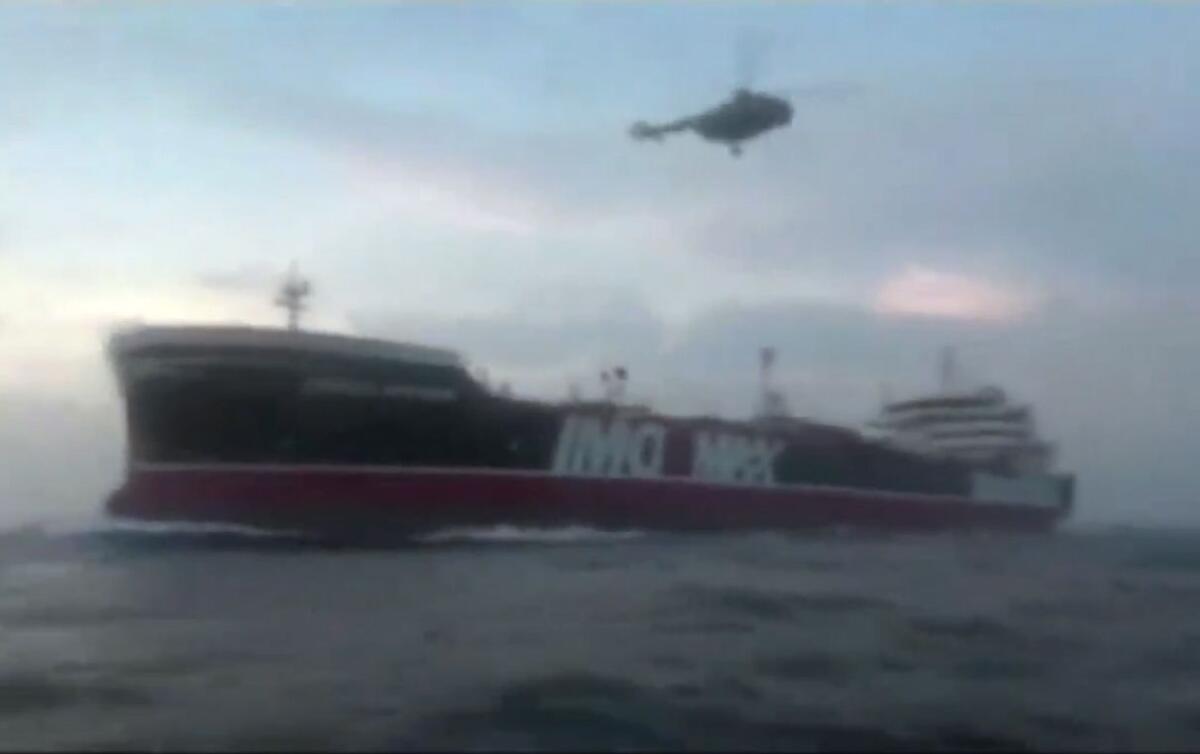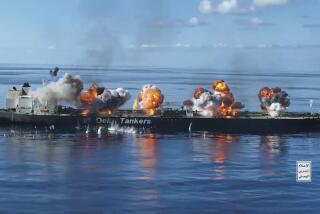Britain mounts diplomatic response for Iran to release tanker

- Share via
LONDON — Britain mobilized a diplomatic broadside — but no immediate military action — against Iran on Saturday in retaliation for its seizure of the Stena Impero, a British-flagged tanker, in the Strait of Hormuz. Iran’s top diplomat in London was summoned to the foreign office, while British Foreign Minister Jeremy Hunt expressed “his extreme disappointment” in a phone call to Mohammad Javad Zarif, his Iranian counterpart.
British ships were also warned to temporarily avoid the strategic Middle East waterway and top government officials were looking for ways to stem the rising tensions while branding Iran’s seizure of the British-flagged vessel an “illegal act.”
“We are looking for ways to deescalate the situation,” Hunt said. “But we are also very clear that we will do what it takes to ensure the safety and security of British and international shipping.”
For the second time in 24 hours, the British government convened an emergency session to discuss the seizure of the tanker in Omani waters “in clear contravention of international law,” Hunt said. “This is totally and utterly unacceptable.”
He said parliament would be updated Monday about any further measures that will be taken but he said the threat level has already been raised to the highest level.
Only last Saturday, Hunt said Iranian officials had reassured him that they wanted to deescalate tensions following the British detention of the Grace 1, an Iranian-affiliated ship, off the coast of Gibraltar.
The vessel was believed to have been carrying crude oil destined for Syria, in violation of EU sanctions.
“This has [to] be about actions not words if we are to find a way through,” Hunt wrote on Twitter. “British shipping must & will be protected.”
Hunt said that, following his conversation with Zarif, and from reading other reports, it was now clear to him that Iran saw Friday’s seizure of the Stena Impero as a “tit for tat situation.”
“Nothing could be further from the truth,” Hunt added.
Hunt also stressed that Britain was not seeking to emulate the “maximum pressure strategy” adopted by the Trump administration.
“They have a different approach to dealing with Iran to us and France and Germany,” Hunt said. “We continue to support the Iran nuclear deal. This is about the safety of British and international shipping in one of the most important seaways in the world.”
Opposition Labor Leader Jeremy Corbyn also sought to distance himself from Trump’s stance toward Iran.
“The U.K. tanker under Iranian control, and its crew, must be released,” Corbyn wrote on Twitter. “Escalation risks a deeper conflict, all sides must show restraint. Trump tearing up the Iran nuclear deal has fueled confrontation. Its negotiated reinstatement is essential to defuse threat of war in the Gulf.”
Meanwhile, Iran released a video of the seizure operation on Saturday, which can be seen here.
The clip, published by Iranian news agencies, depicted a helicopter hovering over the Stena Impero (its name can be seen on the port side bow) before showing balaclava-masked Iranian commandos rappelling onto the ship’s deck to the cheers of an Iranian marine filming the operation from a nearby speedboat.
Later, other Iranian patrol boats can be seen flanking the ship.
Iranian officials from various branches of government gave different justifications for holding the vessel.
Allah-Morad Afifipoor, head of Iran’s Ports and Maritime Organization in Hormozgan Province, the southern Iranian province where the ship is docked in the port of Bandar Abbass, said the tanker had collided with a fishing boat.
The British tanker, which Afifipoor said had no cargo, did not respond to repeated requests for contact from the fishing boat, whose crew then contacted maritime authorities. The vessel was intercepted and taken to the port for an investigation, which began Saturday, he said.
“All its 23 crew members will remain on the ship until the investigation is over,” Afifipoor said in an interview with Iranian news channels. “If necessary, and at the request of judicial authorities, the crew may be summoned for technical and specialist interviews.”
Spokesman for Iran’s Islamic Revolutionary Guards Corps Sardar Sharif, said in an interview with the semi-official Iranian Students’ News Agency that the ship was moving in a lane designated for exiting the Strait rather than the entrance corridor.
The ship had also polluted water around it, said Sharif, and had turned off its Automatic Identification System, which is broadcast via onboard transponders and is used to avoid collisions.
Foreign minister Zarif, meanwhile, tweeted Saturday that “unlike the piracy in the Strait of Gibraltar, [Iran’s] action in the Persian Gulf is to uphold maritime rules,” in a reference to the seizure by British authorities of the Grace 1 tanker off of Gibraltar earlier this month.
He added that it was Iran “that guarantees the security of the Persian Gulf and the Strait of Hormuz.”
In the phone call with Hunt, according to a report from the semi-official Fars News agency, Zarif said the ship had committed a violation and that it must be followed up “through legal channels.”
Abbas Ali Kadkhodaei, spokesman for Iran’s Guardian Council, meanwhile, said,
“The rule of reciprocal action is well known in international law.”
Friday’s interception brings the region closer to the specter of a new round of the so-called Tanker Wars, which began as part of the 8-year war between Iran and Iraq. In 1987, tit-for-tat attacks on shipping in the Persian Gulf between Iran and Iraq pushed the U.S. to launch Operation Earnest Will, which provided military protection to oil transport in the region and comprised some of the largest naval convoys since World War II.
On Saturday, Saudi Arabia said in a statement from its foreign ministry that King Salman, the country’s ruler, had “approved hosting U.S. armed forces in the Kingdom to increase joint cooperation in defense of regional security and stability and to preserve its peace.”
It represented, Saudi Arabia’s foreign ministry said, a strengthening of the U.S. and Saudi Arabia’s “longstanding partnership in the face of regional threats.”
The statement came one day after U.S. Central Command said the Secretary of Defense had authorized a troop deployment in Saudi Arabia.
“This movement of forces provides an additional deterrent, and ensures our ability to defend our forces and interests in the region from emergent, credible threats,” said the statement.
“U.S. Central Command continually assesses force posture in the region and is working with Kingdom of Saudi Arabia authorities to base U.S. assets at the appropriate locations.”
More to Read
Sign up for Essential California
The most important California stories and recommendations in your inbox every morning.
You may occasionally receive promotional content from the Los Angeles Times.











